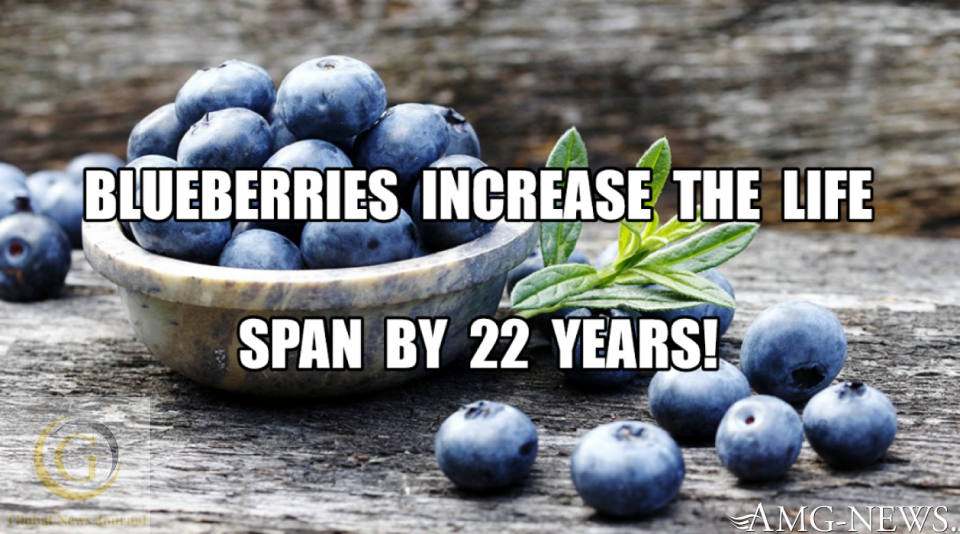As we get older, the internal DNA repair process loses its efficiency. Nutrition is an essential factor in aging, fighting diseases and increasing lifespan.
The researchers found that blueberries play an important role in longevity, by acting in depth on the DNA, helping to repair the damaged cells.
Blueberries are extremely valuable plant medicine products, used for therapeutic purposes since ancient times. They have antibacterial, vascular tonic, liver regenerating and hypoglycemic properties ,support heart and brain health .
A study by the US Department of Agriculture showed that these sweet fruits contain compounds that delay the aging process . The blueberry extract is so strong that it can increase the life span by 28% , the equivalent of 22 years.
Blueberries contain powerful antioxidants that support and stimulate the process of repairing human DNA and act directly on genes associated with aging, increasing longevity . They neutralize free radical damage, reduce oxidative stress at the deep level (on tissues and cells), and stimulate genes responsible for protecting cells.
The content in the repair and antioxidant compounds of blueberries is justified by the challenging environment and the harsh conditions in which these fruits grow: sandy soils, dry lands, at high altitudes.
Related: Medieval Lessons: The Most Powerful Natural Antibiotic Ever – Killes Any Infections In The Body
The regular consumption of blueberries can be an easy way to protect ourselves from premature aging and degenerative diseases. If besides blueberries, our diet will also contain pomegranates and green tea , the anti-aging effects will be even greater.
In addition to protecting the functions and tissues of the brain from premature aging , it repairs DNA damage , blueberries have outstanding anticancer potential , scientifically proven.
Here are just a few reasons why we deserve to make substantial supplies of blueberries in season. We can keep them in the freezer and use them in different recipes with therapeutic value: juices, smoothies or fruit salads.
If you have not managed to put blueberries over the winter, you can buy them frozen, in bags, from the big supermarkets. They are found in different combinations, with other antioxidant-rich berries, such as black and red currants, raspberries or strawberries.

Fast facts on blueberries:
- Blueberries contain a plant compound called anthocyanin. This gives blueberries both their blue color and many of their health benefits.
- Blueberries can help heart health, bone strength, skin health, blood pressure, diabetes management, cancer prevention, and mental health.
- One cup of blueberries provides 24 percent of a person recommended daily allowance of vitamin C.
- Use blueberries to top waffles, pancakes, yogurt, oatmeal, or cereal, blend them in a smoothie or syrup, or fold them into muffins and sweet breads.
- People who use blood-thinners, such as warfarin, should speak to their doctor before increasing their intake of blueberries, as the high vitamin K content can affect blood clotting.
Also: This Secret Ancient Japanese Tonic Recipe Will Help You Melts 54 LBS Of Fat. Watch the video below:
Benefits:
1) Maintaining healthy bones
Blueberries contain iron, phosphorous, calcium, magnesium, manganese, zinc, and vitamin K. Each of these is a component of bone. Adequate intake of these minerals and vitamins contributes to building and maintaining bone structure and strength.
Iron and zinc fulfil crucial roles in maintaining the strength and elasticity of bones and joints.
Low intakes of vitamin K have been linked to a higher risk of bone fracture. However, adequate vitamin K intake improves calcium absorption and may reduce calcium loss.
2) Skin health
Collagen is the support system of the skin. It relies on vitamin C as an essential nutrient, and works to help prevent skin damage caused by the sun, pollution, and smoke. Vitamin C may also improve collagen’s ability to smooth wrinkles and enhance overall skin texture.
One cup of blueberries provides 24 percent of the recommended daily allowance of vitamin C.
3) Lowering blood pressure
Maintaining low sodium levels is essential to keeping blood pressure at a healthful level. Blueberries are free of sodium.
They contain potassium, calcium, and magnesium. Some studies have shown that diets low in these minerals are associated with higher blood pressure. Adequate dietary intake of these minerals is thought to help reduce blood pressure.
However, other studies have counteracted these findings. For example, a 2015 study of people with metabolic syndrome found that daily blueberry consumption for 6 weeks did not affect blood pressure levels.
4) Managing diabetes
Studies have found that people with type 1 diabetes who consume high-fiber diets have low blood glucose levels, and people with type 2 diabetes who consume the same may have improved blood sugar, lipid, and insulin levels. One cup of blueberries contributes 3.6 grams (g) of fiber.
Also: Big Diabetes Lie Presentation From the Doctors !
A large 2013 cohort study published in the BMJ suggested that certain fruits may reduce the risk of type 2 diabetes in adults.

Over the course of the study, 6.5 percent of the participants developed diabetes. However, the researchers found that consuming three servings per week of blueberries, graes, raisins, apples or pears reduced the risk of type 2 diabetes by 7 percent.
5) Protecting against heart disease
Blueberries heart health. Blueberries can help to preserve cardiovascular health. The fiber, potassium, folate, vitamin C, vitamin B6, and phytonutrient content in blueberries supports heart health.
The absence of cholesterol from blueberries is also beneficial to the heart. Fiber content helps to reduce the total amount of cholesterol in the blood and decrease the risk of heart disease.
Vitamin B6 and folate prevent the buildup of a compound known as homocysteine. Excessive buildup of homocysteine in the body can damage blood vessels and lead to heart problems.
According to a study from the Harvard School of Public Health and the University of East Anglia, in the United Kingdom (U.K.) regular consumption of anthocyanins can reduce the risk of heart attack by 32 percent in young and middle-aged women.
The study found that women who consumed at least three servings of blueberries or strawberries per week showed the best results.
6) Preventing cancer
Vitamin C, vitamin A, and the various phytonutrients in blueberries function as powerful antioxidants that may help protect cells against damage from disease-linked free radicals.
Research suggests that antioxidants may inhibit tumor growth, decrease inflammation in the body, and help ward off or slow down esophageal, lung, mouth, pharynx, endometrial, pancreatic, prostate, and colon cancers.
Blueberries also contain folate, which plays a role in DNA synthesis and repair. This can prevent the formation of cancer cells due to mutations in the DNA.
7) Improving mental health
Population-based studies have shown that consumption of blueberries is connected to slower cognitive decline in older women.
Studies have also found that in addition to reducing the risk of cognitive damage, blueberries can also improve a person’s short-term memory and motor coordination.
8) Healthy digestion, weight loss, and feeling full
Blueberries help to prevent constipation and maintain regularity for a healthful digestive tract because of their fiber content.
Dietary fiber is also commonly recognized as an important factor in weight loss and weight management by functioning as a “bulking agent” in the digestive system. High fiber foods increase satiety, or the feeling of being full, and reduce appetite.
Also: Legends of America: Native American and Other Ancient Remedies. Video below:
Feeling fuller for longer can reduce a person’s overall calorie intake.
Blueberries also contain copper, beta-carotene, folate, choline, vitamins A and E, and manganese.
As well as anthocyanins, vitamins, and minerals, blueberries contain a diverse range of phenolic compounds such as quercetin, kaempferol, myricetin, and chlorogenic acid. These contribute to the antioxidant capacity of blueberries.
The large quantities of bioactive compounds place blueberries high on the Aggregate Nutrient Density Index (ANDI). This index rates foods based on their vitamin and mineral content, phytochemical composition, and antioxidant capacity.
Foods with the most nutrients per calorie have the highest rankings, and blueberries are placed among the top fruits and vegetables for nutrient density, with an ANDI score of 132.
ANDI is one of several rating systems for food nutrition, but further research is needed to determine the role of specific foods in disease prevention.
Our mission to champion democracy, freedom of speech, and patriotic values relies on the support of dedicated individuals like you. Your contribution is vital in helping us provide insightful analysis, uncover pressing issues, and inspire positive change in our nation.
Join us in our commitment to making a difference. Every donation counts and empowers us to continue our work in advocating for the values we hold dear.
Thank you for being a crucial part of our journey.

I’m a 33-year-old writer and the founder of World Reports Today. Driven by the timeless principles of democracy and freedom of speech, I use my platform and my writing to amplify the voices of those who uphold these ideals and to spark meaningful conversations about the issues that truly matter.









